We, at Cuddle Clones, know that treating your dogs well goes beyond playtime and grooming. Our community takes pet care seriously, often going above and beyond to ensure the health and happiness of our furry friends. A crucial aspect of this care is knowing what foods are bad for dogs.
Unfortunately, despite our best efforts, there’s no way for one person to know everything they need to know to keep their best friend safe, and that is especially true when it comes to food and treats. March is Pet Poison Prevention Month, and according to the ASPCA’s Poison Control Center, food is responsible for over 20% of calls they receive. While many of us love to treat our pups with the occasional morsel of human food, it is vitally important that we understand which foods are safe for consumption for our canine companions.
So, in honor and observance of Pet Poison Prevention Month, we have researched and compiled a dog's list of foods don't can't have! Please note that this is not an exhaustive list, so just because a food isn’t listed below doesn’t mean it’s necessarily safe (or advisable) for your dog. Be sure to consult with your veterinarian before treating your dog with human food, and always make sure that treats make up only a small portion of a wholesome and nutritious diet. Remember, treats should be no more than 10% of your dog’s daily caloric intake, so treat wisely and sparingly! Check out our previous blog for a list of human foods your dogcan eat in moderation.
21 Human Foods Dogs Can’t Eat
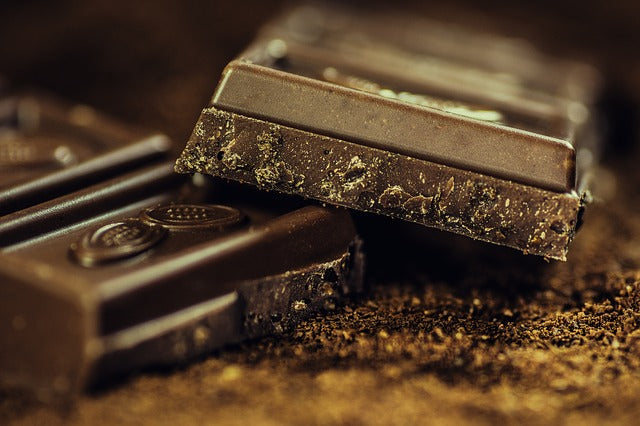
Chocolate
This one almost goes without saying, but we would be remiss if we did not mention chocolate. There’s a reason it’s #1 on our list. Chocolate is one of the most well-known foods dogs can’t eat. Instances of dogs eating chocolate accounts for 10% of all calls to the ASPCA Poison Control Center on its own!
Chocolate contains theobromine, an alkaloid that can cause issues ranging from vomiting and diarrhea on the mild end of the spectrum to lethal consequences like seizures and heart failure.
The darker the chocolate, the worse the outcome, so be sure to keep your sweet treats out of your dog’s reach.

Xylitol
While mostly safe for humans (it has been known to cause a laxative effect when consumed in too large quantities), Xylitol is highly toxic for dogs. The reason lies in the ways our bodies process xylitol. In humans, xylitol does not prompt the release of insulin from the pancreas.
However, this is not the case with dogs. The presence of xylitol in a dog’s bloodstream causes a rapid spike in insulin production, which robs the blood of necessary sugars and causes hypoglycemia. Hypoglycemia can be life-threatening if left untreated!
In larger quantities, xylitol has also been known to cause liver failure. However, the process by which this occurs is still poorly understood.
Xylitol is often found in human oral care products, gums and mint, and many a dog’s treat of choice, peanut butter. Be sure to only use oral care products designed for canine use and always read the ingredient labels for treating your dog with human food.

Grapes & Raisins
Regardless of size, weight, age, sex, or breed, there is one universal truth among dog owners: never feed your dog grapes or raisins. According to the AKC, even a single grape can be fatal to your dog.
The chemical that causes the reaction is still a mystery. However, the outcome is not. Grapes and raisins are known to cause acute kidney failure, so exercise extreme caution when enjoying this sweet, refreshing treat.

Onions
The chemical culprit behind this pungent vegetable is known as thiosulfate. When ingested in large enough quantities by dogs, the compound leads to a debilitating condition known as hemolytic anemia. Hemolytic anemia destroys your pup’s red blood cells, leaving them with too few to properly perform their vital bodily functions.
The amount of onion needed to cause the potentially fatal condition varies based on the size of your pup, but no amount of onion is good for your dog.

Garlic
As it turns out, two common ingredients in your mealtime mirepoix are deeply unsafe for your best friend to eat. Much like onions, garlic can lead to gastroenteritis or potentially lethal hemolytic anemia.
Powdered garlic can prove even more dangerous than its whole counterpart, as the powder contains a higher density of the substance.
Be careful when prepping dinner, as many pet owners know all too well how common it is for dogs to wait nearby for “treats from heaven”.

Alcohol
This is another entry that should 1,000,000% go without saying, but do not allow your dog to consume alcohol. Much like their owners after one glass too many of merlot, dogs can experience alcohol intoxication, as well as its myriad of negative health effects. However, as their bodies are generally much smaller, the effects are amplified.
Be sure to keep drinks out of your pet’s reach and properly clean spills as soon as they occur. Our pet well-being experts at Hill’s Science Diet put it best: “While a wine-stained rug can be replaced, your dog cannot.”.

Macadamia Nuts
These delicious nuts (often paired with chocolate for a double dose of “do not feed to your dog”) are completely safe for consumption by humans and even cats. However, for some unknown reason, macadamia nuts cause an array of symptoms, including fever, weakness, ataxia, and back legs collapsing.
While rarely fatal, macadamia nut toxicosis is still extremely dangerous for your dog. Plus, as macadamia is often paired with other foods that are toxic to dogs, your dog could potentially be in danger of dealing with the effects of multiple toxins at once.

Coffee & Caffeine
64% of American adults consume coffee every single day. We count on that burst of caffeine to lift our fatigued eyelids and add a much needed pep to our step. However, a mostly harmless stimulant for a human is poison for a pup.
A dog’s body is affected by significantly lower quantities of caffeine than that of a human.
For reference, a typical cup of coffee contains between 100-160 milligrams of caffeine. According to Continental Kennel Club, dogs can begin experiencing potentially fatal symptoms of caffeine poisoning at a mere 23 milligrams per pound of body weight. This puts almost all toy breeds in near immediate, life-threatening danger if too much caffeine is consumed!

Avocado
While the flesh of an avocado is not necessarily going to bother your best friend, the pit poses a serious danger. The pit of the avocado fruit doesn’t digest particularly well and could lead to intestinal blockages!
The other thing to consider with avocados is the extremely high fat content. Some sensitive dogs run the risk of developing pancreatitis from consuming avocado flesh, which is a dangerous inflammation of the pancreas.
So, while your dog may be fine if it eats avocado, it’s simply better not to risk it!

Milk
According to WebMD, puppies are born with an overabundance of the enzyme lactase in their system. This enzyme allows them to drink their mother’s milk and derive the essential, life-giving nutrients it provides!
However, once weaned from their mother, dogs lose most of the lactase in their system. This means that dairy products can cause intense gastrointestinal distress for your best friend.
While the symptoms are relatively mild in the grand scheme of things, too much milk and dairy can lead to vomiting, diarrhea, and intestinal discomfort for your dog.

Bones & Fat Trimmings
We’ve all seen the classic image of the cartoon dog going to town on his jealousy guarded bone. However, giving a dog a bone is a more complicated consideration, especially when the bone in question is cooked.
Cooked bones are highly likely to splinter when consumed by your pup. These splinters can pierce the stomach or intestinal walls, causing internal bleeding and peritonitis, a nasty bacterial infection.
Fat trimmings are also quite problematic! Fat trimmings are, unsurprisingly, loaded with fat. As with many other entries on this list, excess fat can lead to obesity issues, as well as pancreatitis and cardiovascular disease.

Raw Eggs
These next two entries could ruffle a few feathers. Throngs of pet owners and pet food companies swear by the benefits of a raw food diet. However, veterinarians warn that potential foodborne illness could wreak havoc on your dog’s health.
The main potential culprit is salmonella, which leads to the infection salmonellosis. This infection presents as vomiting, diarrhea, lethargy, and in extreme cases, can lead to fever, shock, and anorexia from vomiting.
A dog’s diet is ultimately a pet owner's decision, but we recommend extreme caution when feeding your pup raw food. Always consult with your veterinarian before starting your dog on a raw food diet.

Raw Meat & Fish
K9 of Mine puts it quite succinctly: “Feeding your dog raw meat amounts to very high-stakes poker.”
While your dog may eat raw meat and be just fine, raw meat consumption drastically increases your dog’s likelihood of contracting potentially deadly foodborne illnesses, such as e. Coli.
You’re not likely to set your child down to a meal of raw steak and pork, and the reasoning behind that decision is sound. It may well be worth giving that same consideration to your dog’s diet.

Salt
While sodium is a necessary part of any healthy diet, too much salt isn’t good for anyone, human and pet alike! More often than not, if your dog eats too much salt, they’ll drink extra water to combat the mineral’s dehydrating effects.
However, in large doses, salt can lead to hypernatremia, a condition characterized by dangerous levels of salt in the bloodstream.
The primary effects of salt poisoning are neurological. Muscles and brain tissue will push water into the bloodstream to try to counteract the salt, which in term damages the tissues that desperately need the water to properly function.

Yeast Dough
When a dog consumes bread dough, it is consuming activated yeast. If there is any environment activated yeast loves, it’s warm, wet, and dark.
Kind of sounds like the inside of your dog’s stomach, doesn’t it?
Once consumed, the dough will continue to grow and expand, releasing carbon dioxide into your dog’s stomach that can lead to extreme bloat. This bloat is known asGastric Dilatation Volvulus.
Unlike other gasses, carbon dioxide does not easily exit the body, and if the pressure grows past a certain threshold, your dog could experience terrible health outcomes. These include stomach lining burst, cardiovascular damage, and diaphragm damage. According to The Dog People, even with a treatment, a quarter of dogs with GDV don’t survive. It is imperative to keep yeast dough away from your dog!

Lemons & Limes
Who doesn’t love the zingy tang of lemon and lime? Your dog, that’s who! According to Wag!, “Lemons and limes, like other citrus fruits, contain the essential oils limonene and linalool, as well as a phototoxic compound known as psoralens.”
These compounds are unlikely to pose any serious threat to your dog’s well-being in low quantities, they have been known to cause symptoms ranging from depression and weakness to liver failure and even sudden death in large quantities.
The good news is, just like their humans, most dogs will have a hard time chowing down on an entire lemon!

Nutmeg
Nutmeg is poisonous to dogs in large quantities, and while it is unlikely that your dog will consume this aromatic spice in large enough quantities to cause dangerous complications, it is still important to know about!
What you may not know is that nutmeg is a natural hallucinogenic, meaning that large quantities could lead to a very scary experience for your pup. Nutmeg contains a toxic compound known as myristicin, which is actually toxic to both pets and people when consumed in large amounts.

Rhubarb
This is one you don’t hear about often. While we love the tart, tanginess of rhubarb when added to a deliciously sweet baked good, our dogs most certainly do not.
Rhubarb contains a potent antinutrient known as oxalic acid. This substance creates painful crystals in the urinary tract, and in large enough doses, can lead to full-blown kidney failure.
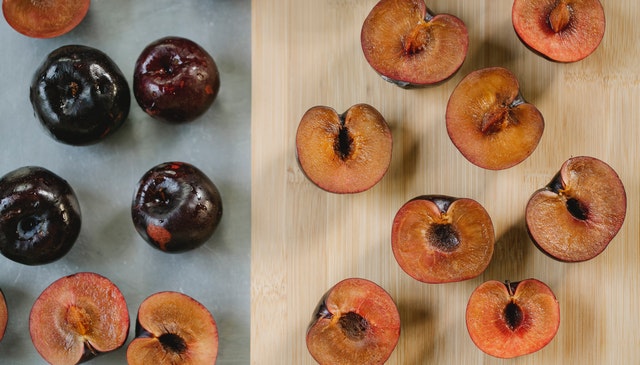
Fruit Seeds & Pits
Apple seeds, as well as peach, plum, apricot, and cherry pits all contain one of the most dangerous, toxic substances known to man: cyanide. When consumed in large enough quantities, these seeds and pits can lead to lethal amounts of cyanide in your pet’s system.
Not only that, but the fruit pits also pose a risk to your dog’s intestinal tract, as they have been known to cause blockages.

Spoiled Food
While we certainly don’t believe any loving and dedicated pet owner would ever purposely feed their dog spoiled food, we all know how mischievous our canine companions can be.
Oftentimes, the only thing separating our dogs from a belly full of spoiled rotten food is a garbage can.
Despite the species’ reputation for cast iron stomachs, eating spoiled food leaves dogs susceptible to a condition known as garbage toxicosis (or “garbage gut”, colloquially). While rarely fatal, the bacteria produced by the condition can cause a wide variety of negative health effects, including pain, vomiting, diarrhea, weakness, shock, and in rare cases, seizures!

Spicy Food
The chemical compound that makes spicy food spicy is called capsaicin. Just like in humans, your extra spicy buffalo wings can cause gastrointestinal distress and present with symptoms like diarrhea, vomiting, gas, and abdominal discomfort.
What If Your Dog Eats Something Bad?
If you suspect your dog has eaten something toxic, remember to stay calm. Reach out to your vet immediately or contact the ASPCA Animal Poison Control Center. They have the expertise to guide you through the situation and ensure your pet's safety.
In addition to the items listed above, it's also important to mention a few more foods that dogs can't eat that often come as a surprise to pet owners. These include raw potatoes and tomato plants. While these might not be as common in most diets, both contain solanine, a toxic chemical to dogs. So next time you're in the kitchen, make sure to keep these foods out of reach.
It's crucial to know what foods dogs can't eat, as well as which human foods dogs can eat, to ensure their well-being. Even foods that seem harmless can cause health issues for our four-legged friends. And remember, when in doubt, always consult with a professional. At Cuddle Clones, we believe in fostering a loving and safe environment for our pets, and knowing what foods are safe for our dogs is a vital part of that mission.

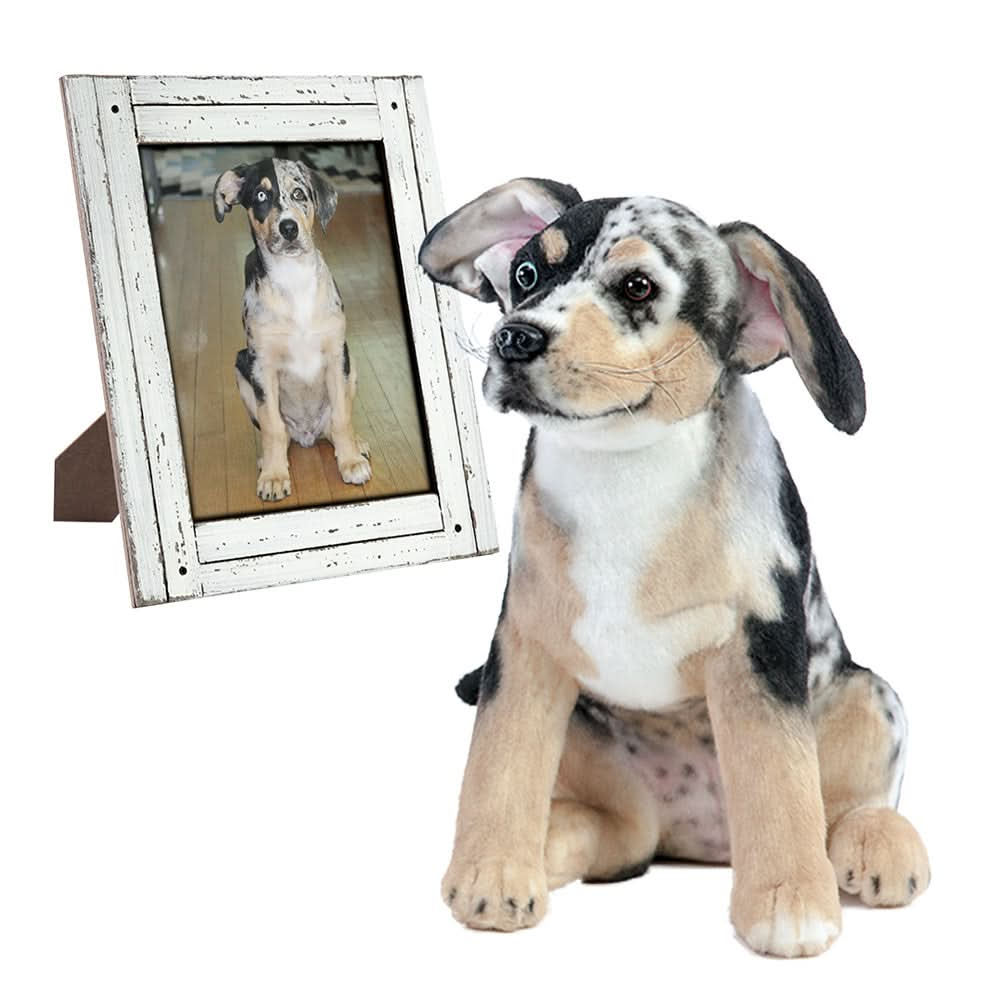
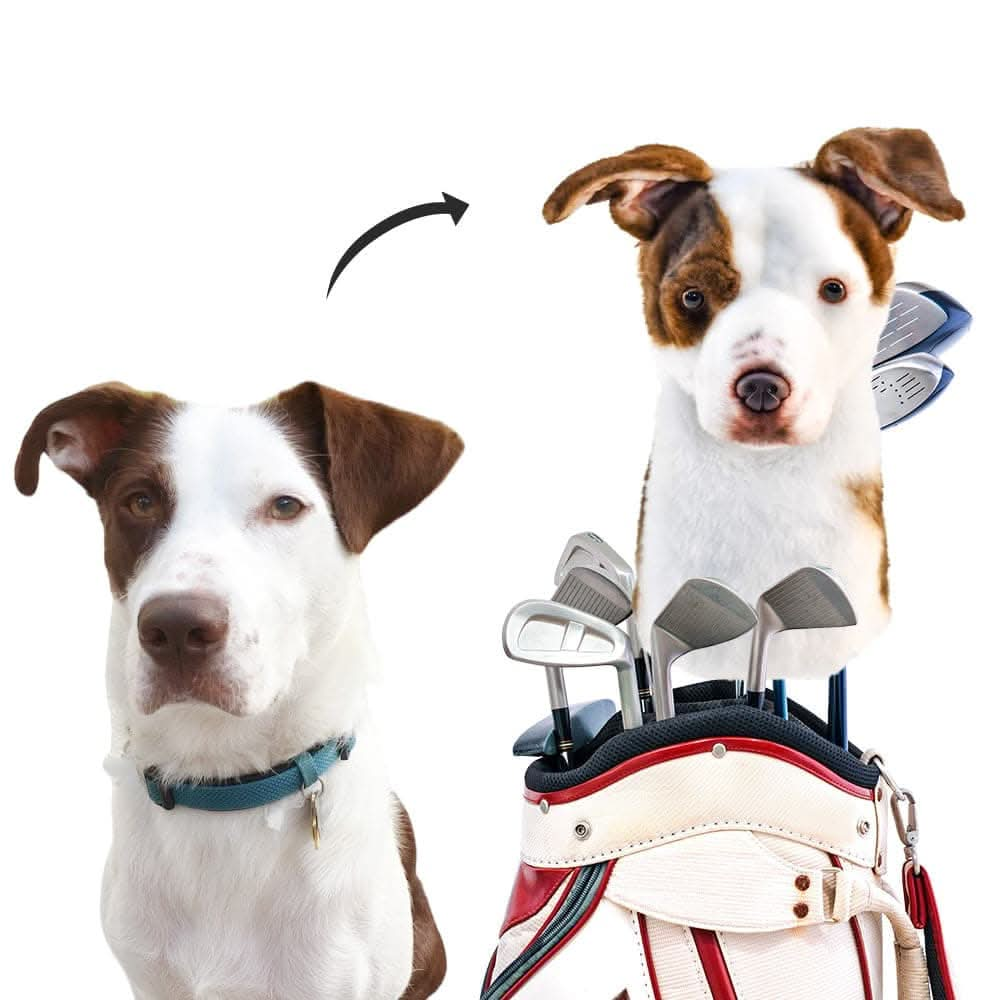
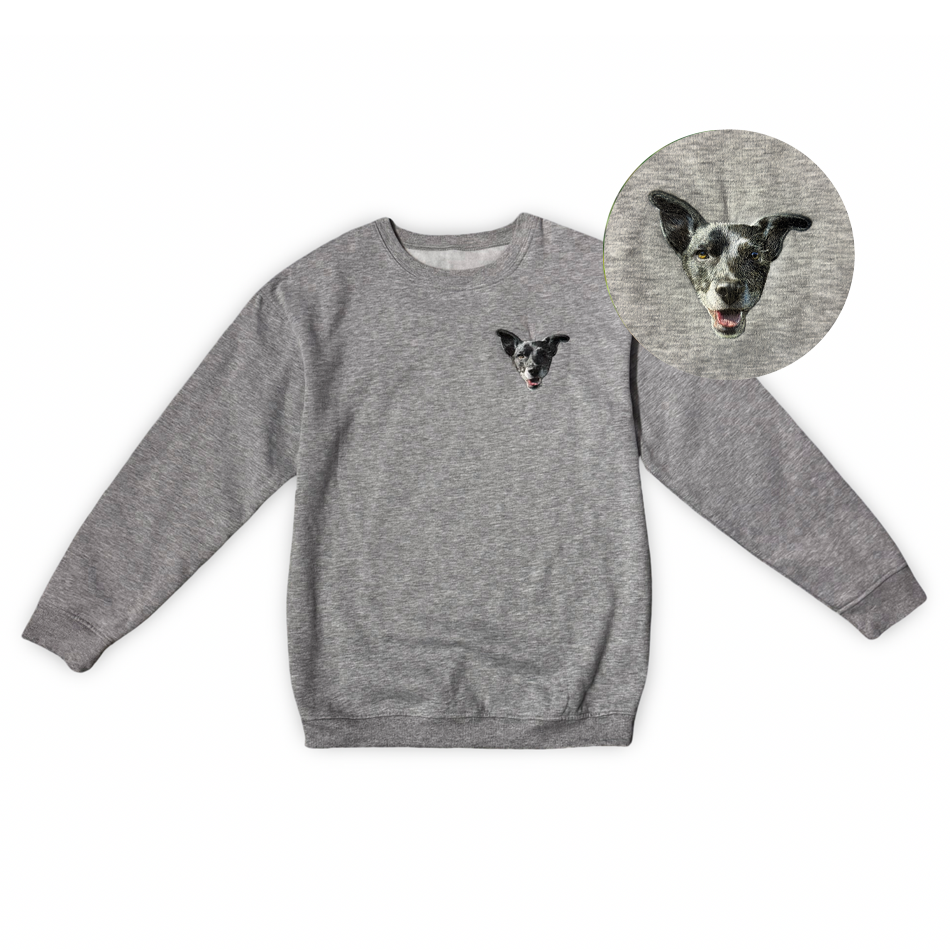
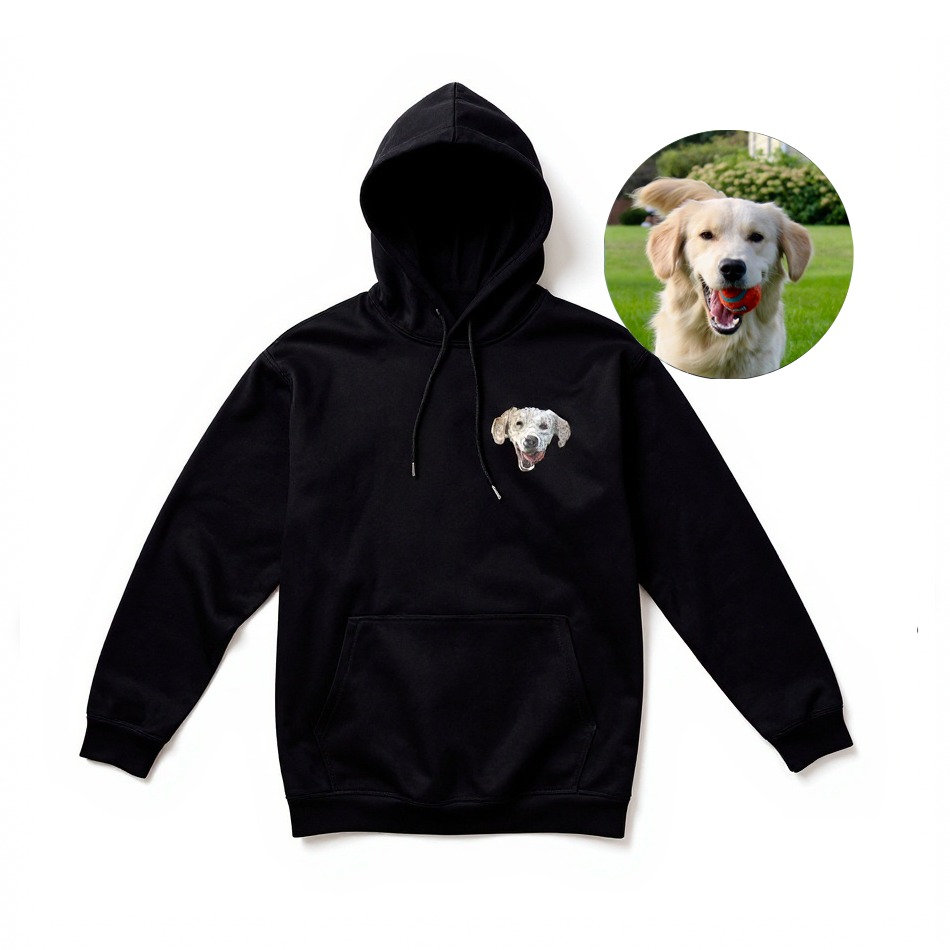
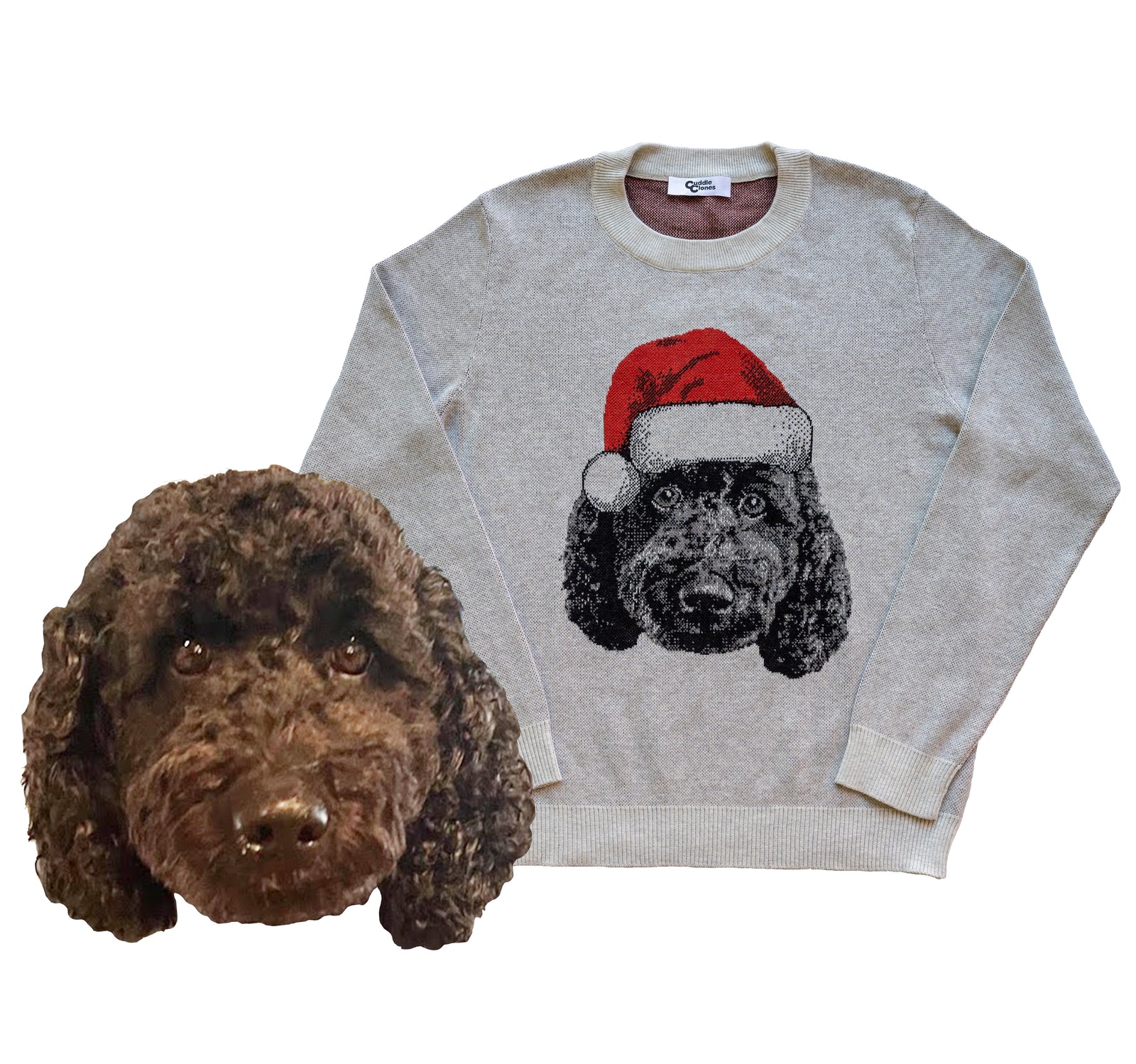
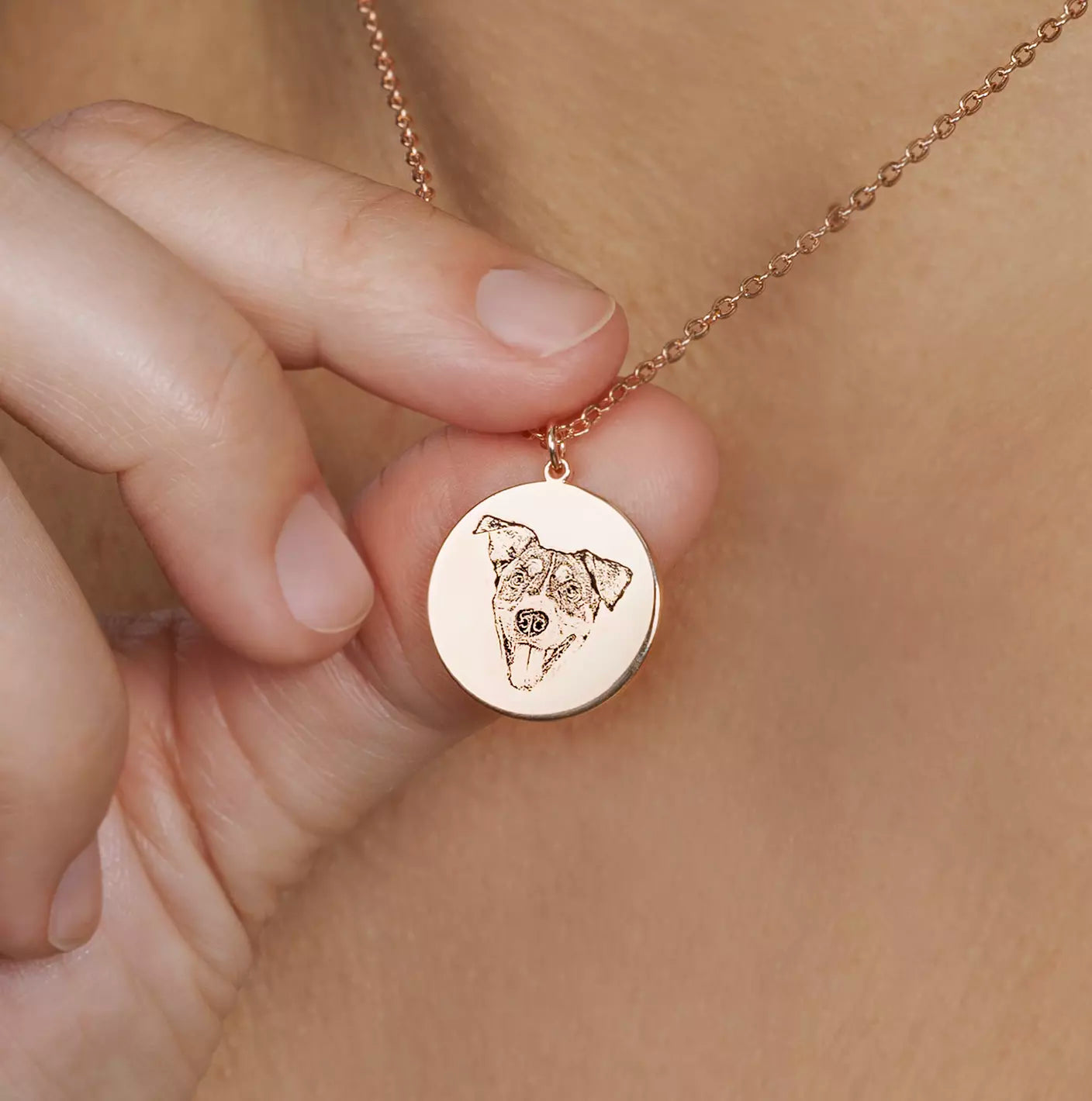
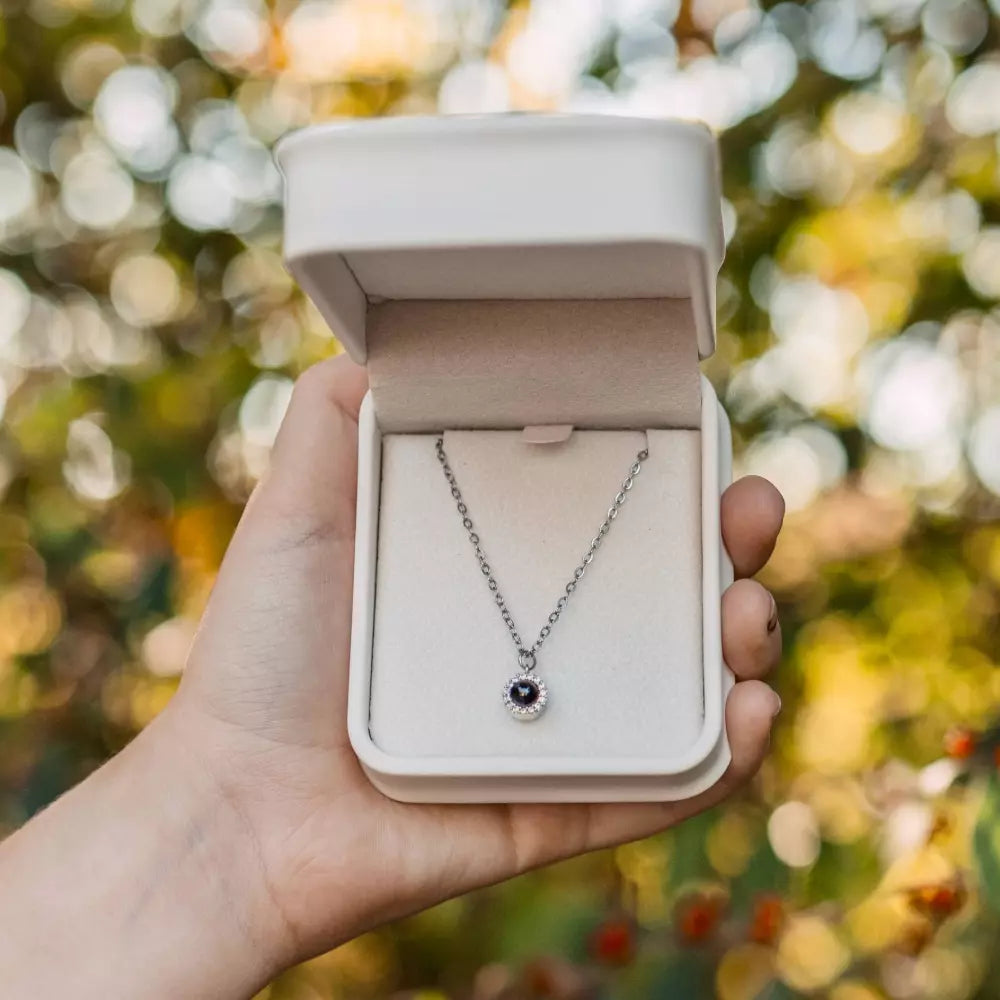
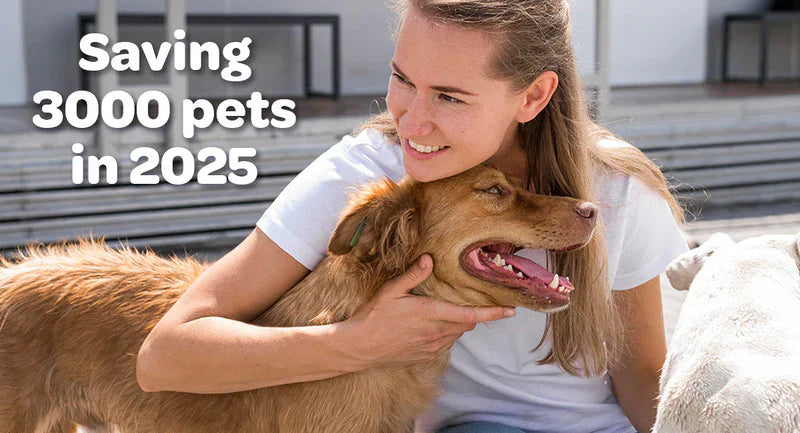
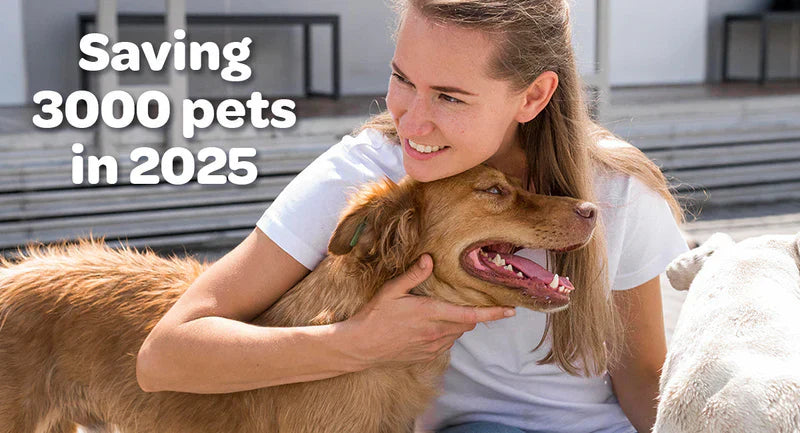
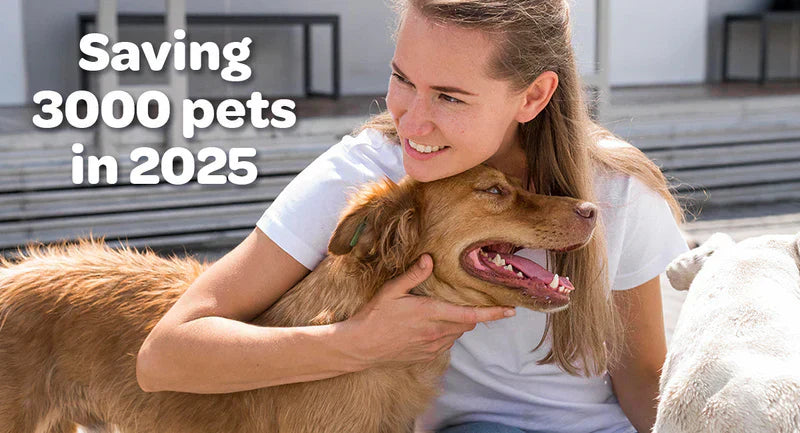
Leave a comment (all fields required)